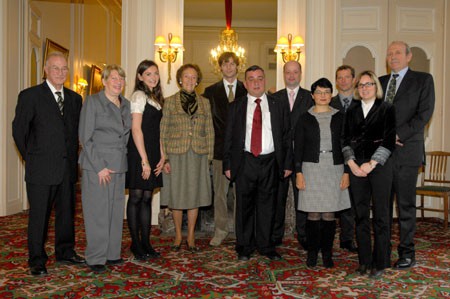The winners of the Fondation Napoléon History Grands Prix and Research grants 2007 received their awards at a lunch on Monday on 19 November, 2007, held in the Paris Jockey Club and presided over by HIH the Princesse Napoléon and the Prince d'Essling.
The prizes are awarded for historical work on the two French empires.
Pierre Branda won the Grand Prix for his book: Le Prix de la Gloire, Napoléon et l’argent
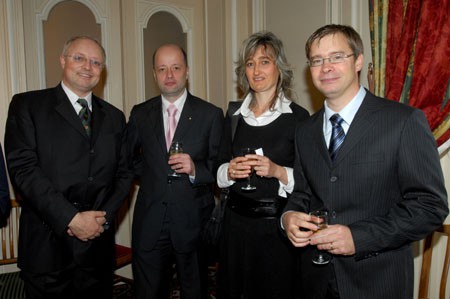 With his greatcoat and his hat, Napoleon passes for a simple man, not in the least influenced by “filthy lucre”. And yet, money was the emperor's constant companion. To forget this is to forget that the French Revolution, to which Napoleon owed everything, was the direct consequence of a financial crisis which the Ancien Régime was unable to solve. To forget this is to forget that the devaluation of paper money was one of the principal factors for the Directory's discredit, which itself favoured the arrival of a man able to re-establish order. To forget this is to forget that the military expeditions planned or led by Bonaparte (Italy or Santo Domingo) were organised for economic reasons or failed for serious lack of funds (Egypt). Such amnesia however would also unjustly minimise the consular regime's contribution to the re-establishment of national finances. It would be to forget the extraordinary feat performed by Napoleon of financing fifteen years of war without bankrupting the state, when twenty years earlier French assistance in the American war of Independence, on a relatively modest military level, had brought a thousand-year-old French monarchy to its knees.
With his greatcoat and his hat, Napoleon passes for a simple man, not in the least influenced by “filthy lucre”. And yet, money was the emperor's constant companion. To forget this is to forget that the French Revolution, to which Napoleon owed everything, was the direct consequence of a financial crisis which the Ancien Régime was unable to solve. To forget this is to forget that the devaluation of paper money was one of the principal factors for the Directory's discredit, which itself favoured the arrival of a man able to re-establish order. To forget this is to forget that the military expeditions planned or led by Bonaparte (Italy or Santo Domingo) were organised for economic reasons or failed for serious lack of funds (Egypt). Such amnesia however would also unjustly minimise the consular regime's contribution to the re-establishment of national finances. It would be to forget the extraordinary feat performed by Napoleon of financing fifteen years of war without bankrupting the state, when twenty years earlier French assistance in the American war of Independence, on a relatively modest military level, had brought a thousand-year-old French monarchy to its knees.
Thomas Munch-Petersen won the prize for a book in a language other than French with Defying Napoleon
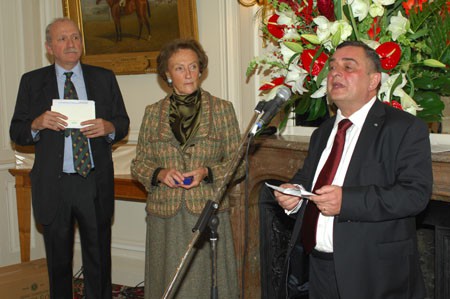 In the later summer of 1807 a new era of British international politics dawned with the aggressive bombing of Copenhagen by British forces. This book by Thomas Munch-Petersen, senior lecturer in Scandinavian History at University College London, UK, is one of the first ever monographs in English on the subject. It deals in detail with the Anglo-Danish diplomatic wranglings which preceded the show of force, Danish relations with France and finally the bombardment itself. The book is based on extensive original research in British and mainly Scandinavian archives and offers new evidence and interpretations. Most of all, it tells the story of Napoleon Bonaparte's “ferocious will”, Alexander I's “devious and nebulous ambitions” and George Canning's “determination” at the time of this famously unprovoked aggression against a neutral state and the terror bombardment of a civilian population.
In the later summer of 1807 a new era of British international politics dawned with the aggressive bombing of Copenhagen by British forces. This book by Thomas Munch-Petersen, senior lecturer in Scandinavian History at University College London, UK, is one of the first ever monographs in English on the subject. It deals in detail with the Anglo-Danish diplomatic wranglings which preceded the show of force, Danish relations with France and finally the bombardment itself. The book is based on extensive original research in British and mainly Scandinavian archives and offers new evidence and interpretations. Most of all, it tells the story of Napoleon Bonaparte's “ferocious will”, Alexander I's “devious and nebulous ambitions” and George Canning's “determination” at the time of this famously unprovoked aggression against a neutral state and the terror bombardment of a civilian population.
Monsieur and Madame Bernard Quintin were awarded the Jury Special Prize for their life’s work
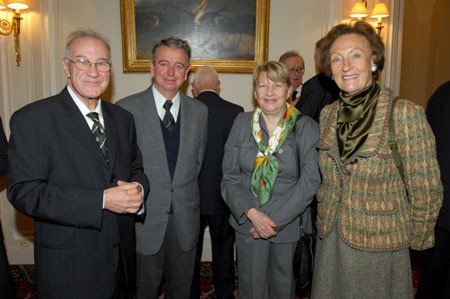 – Dictionnaire des colonels de Napoléon (1996, Editions SPM),
– Dictionnaire des colonels de Napoléon (1996, Editions SPM),
A biographical dictionary of 1,574 colonels and adjudants commandants in service during the First Empire. It details their regiments, their provenance (social and military), their promotions, their subsequent history after the fall of the empire, their parliamentary roles, their distinctions, their deaths and gravestones. – Dictionnaire des capitaines de vaisseaux de Napoléon (2003, Editions SPM)
A biographical dictionary of 194 capitaines de vaisseaux (ship's captains) in the French navy during the First Empire. Includes tables giving geographical origin and gives details concerning their professions, their political roles, their distinctions, sanctions, etc. The work opens with an exceedingly useful prosopographical study.
– Austerlitz, 2 décembre 1805 : dictionnaire biographique des soldats de Napoléon tombés au champ d'honneur (2004, Archives et Cultures Editions)
A biographical dictionary of the 1,057 French officers, NCOs and rank and file killed or mortally wounded at Austerlitz.
– Dictionnaire des soldats français morts à la bataille d'Eylau (2006, Archives et Cultures Editions)
This work begins with a resumé of the Polish campaign in January and February 1807, giving totals for the forces present and the various phases of the battle of Eylau. It then continues with a biographical dictionary of all the soldiers in the Grande Armée killed at Eylau giving date and place of birth, the circumstances of their death and their military career. Included amongst the many appendices is an index of those killed at Eylau arranged by département. The work is intended as a homage to the memory of those Frenchmen who gave their lives for the victory at Eylau.
The 2007 Research Grants
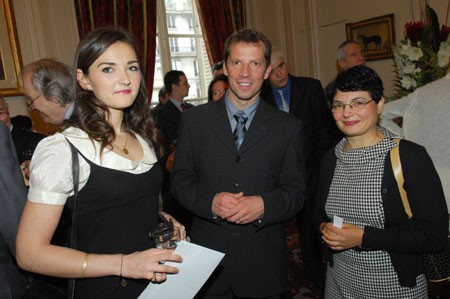 Every year, grants are awarded to students beginning PhDs on First or Second Empire subjects. This year the following research projects were supported:
Every year, grants are awarded to students beginning PhDs on First or Second Empire subjects. This year the following research projects were supported:
First Empire
• The forgotten Napoleonic code: the Code Militaire, by Eman Vovsi
supervised by Rabe Blaufarb, Florida State University, Tallahassee (Florida)
• Jean-Baptiste Isabey (1767-1855): the artist and his times, by Cyril Lecosse
supervised by Professor Philippe Bordes, Université Lyon II
• Britain and French Emigration: joint projects for a restoration of the monarchy in France (1793-1814), by Eléonore Pahlavi supervised by Professor Jacques-Olivier Boudon, Paris IV Sorbonne
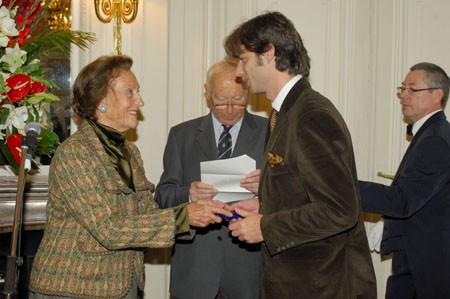 • Jean-Baptiste Jacques Augustin, by Bernd Pappe supervised by Professeur Pascal Griener, Université de Neuchâtel (Suisse)
• Jean-Baptiste Jacques Augustin, by Bernd Pappe supervised by Professeur Pascal Griener, Université de Neuchâtel (Suisse)
• A municipality during the First Empire: Lyon, 1805-1815, by Jean-Philippe Rey
supervised by Professor Bruno Benoît, Université Lyon II
• The First Consul's participation in the preparatory work for the Code Civil, by Leïla Saada supervised by Professor Alain Desrayaud, Université Paris XII
Second Empire
• Mellerio/Meller, the history of a Parisian jewellers in the 19th century, by Marie-Emilie Vaxelaire
supervised by Professeur Bruno Foucart, Paris IV – Sorbonne


